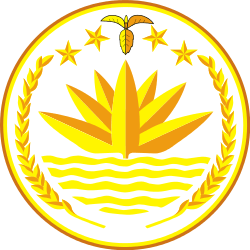Local government in Bangladesh
 |
| This article is part of a series on the politics and government of Bangladesh |
|
Constitution |
|
Executive |
|
|
Political parties |
|
Foreign policy |
In Bangladesh the rural/regional local government have three tiers:
- Zila Parishads
- Upazila Parishads
- Union Parishads (made up of nine Villages)
Due to rapid growth of towns and cities, in sub-urban area the Union Parishad is frequently replaced by the Municipal Corporations(Pourashava) and City Corporations.
There are 64 districts in Bangladesh, each further subdivided into upazila (subdistricts) or thana. The area within each police station, except for those in metropolitan areas, is divided into several unions, with each union consisting of multiple villages. Direct elections are held for each union (or ward), electing a chairperson and a number of members. In 1997, a parliamentary act was passed to reserve three seats (out of 12) in every union for female candidates.[1]
In the metropolitan areas, police stations are divided into wards, which are further divided into mahallas. The cities with a city corporation, having mayoral elections, include Dhaka South, Dhaka North, Chittagong, Khulna, Sylhet, Rajshahi, Barisal, Rangpur, Comilla and Gazipur. Other major cities, these and other municipalities electing a chairperson, include Mymensingh, Gopalganj, Jessore, Bogra, Dinajpur, Joypurhat, Narayanganj and Rangamati. Both the municipal heads are elected for a span of five years.
References
- ↑ Local Government Act, No. 20, 1997